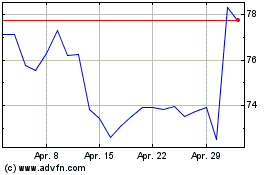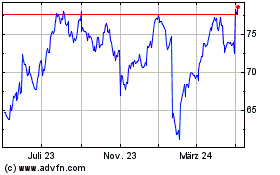Chemical-Discharge Case Against DuPont Goes to Trial
14 September 2015 - 3:40AM
Dow Jones News
An Ohio woman seeking compensation for health problems allegedly
caused by water contamination from chemical giant DuPont Co. is
headed to trial this week, and its outcome could affect thousands
of claims filed by other U.S. residents in a long-standing
case.
The federal civil trial in Columbus, Ohio, will focus on
59-year-old Carla Bartlett, a Guysville, Ohio, resident who says
she suffered kidney cancer as a result of a toxic chemical
discharged by a DuPont plant in West Virginia into the drinking
water of surrounding areas.
DuPont has denied liability for her illnesses.
Ms. Bartlett's case is the first of about 3,500 personal-injury
claims filed against DuPont to head to trial, with jury selection
expected to begin Monday.
The original class-action lawsuit was filed in 2001 by thousands
of residents living in Parkersburg, W.Va., or near its plant
there.
DuPont reached a settlement with the group in 2004 that included
an agreement to pay for water filtration systems and a medical
monitoring program to determine whether C-8 caused any adverse
health effects.
Ms. Bartlett's case was selected to act as one of the bellwether
trials that will determine how DuPont should proceed against the
other individual plaintiffs, lawyers said.
Ms. Bartlett's lawyers allege in court documents that DuPont
researchers knew about the potential toxicity of C-8—a chemical
used to make Teflon products—since as early as the 1960s but failed
to disclose the information to communities where DuPont plants were
located.
Her lawyers claim DuPont misled the public about the health
consequences of C-8 and even increased its usage despite knowing
its effects.
DuPont also refused to install readily available technologies
that could have reduced the amount of C-8 emitted into the air or
water, Ms. Bartlett's lawyers alleged.
In an emailed statement, a spokesman for DuPont said the company
believes Ms. Bartlett's exposure to C-8 "was insufficient to cause
health problems."
DuPont's lawyers also have said in court documents that DuPont
couldn't have foreseen any potential health risks to Ms. Bartlett
because of limited medical and scientific knowledge available to
the company at the time.
The company has worked with regulators and voluntarily created a
global program to phase out the use of C-8, although the chemical
"has been safely and widely used by many companies for decades,"
DuPont's spokesman said.
After a more than seven-year study, an independent panel of
scientists found a likely link between C-8 exposure and six
diseases, including kidney cancer and thyroid cancer, allowing
plaintiffs with these diseases to file individual claims against
DuPont.
Separately in 2005, DuPont paid $16.5 million to the
Environmental Protection Agency to settle allegations that the
company hid information on the health and environmental risks of
C-8. DuPont said it didn't admit any liability as part of the
settlement.
Write to Nicole Hong at nicole.hong@wsj.com
Subscribe to WSJ: http://online.wsj.com?mod=djnwires
(END) Dow Jones Newswires
September 13, 2015 21:25 ET (01:25 GMT)
Copyright (c) 2015 Dow Jones & Company, Inc.
DuPont de Nemours (NYSE:DD)
Historical Stock Chart
Von Jun 2024 bis Jul 2024

DuPont de Nemours (NYSE:DD)
Historical Stock Chart
Von Jul 2023 bis Jul 2024
